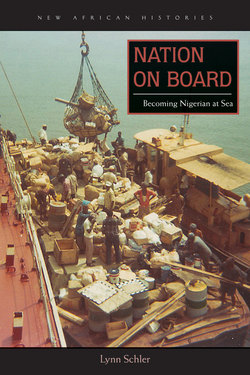Читать книгу Nation on Board - Lynn Schler - Страница 12
На сайте Литреса книга снята с продажи.
Оглавление2
Seamen and the Cosmopolitan Imaginary
The social imaginary is not a set of ideas; rather it is what enables, through making sense of, the practices of a society.*
—Charles Taylor
WHEN COSMOS NIAGWAN was a youth in the village of Shendam in northern Nigeria during the colonial era, he dreamed of becoming a truck driver. As he recalled, “My idea was to do something manly,” and he envisioned himself behind the wheel of a larger trailer truck. This plan for his future quickly changed one night while he was still in secondary school. The colonial Information Service arrived in Shendam with a mobile cinema, and he went along with the rest of the village to watch a film projected onto a makeshift screen set up in front of the local chief’s house. During the newsreels, he saw images of new trailer trucks arriving in Nigeria and being unloaded from a large cargo ship. As he recalled, he was suddenly struck with the realization that a ship is much larger than a truck. Impressed with the immense size of these seagoing vessels, he told himself, “Now THAT is what I am going to drive!”1 As soon as he finished secondary school, he set out on a journey that indeed culminated in his commanding of ships. Niagwan began his career as a seaman with the Nigerian Port Authority (NPA) in 1963 as a marine officer cadet. That year, he was sent by the NPA for study and training at the King Edward VII Nautical College in London, and he worked with Elder Dempster until he earned his second mate certificate of competency in 1967. Following his formal studies, he worked for seven years with the Black Star Line of Ghana and then moved to the Bangladesh Shipping Corporation for two more years before returning to work for the Nigerian National Shipping Line (NNSL) in 1987.
Captain Niagwan’s journey to becoming a seaman began with a set of social imaginaries that organized his view of the world and grounded his course of action. His recounting of the process that brought him to seafaring began with a clear vision of his own potent masculinity and an unhindered sense of possibility. When considering the obstacles that might have stood in the way of the son of a farmer born eight hundred kilometers from the sea in northern Nigeria under the shadow of British colonial rule, his recounting of how he came to command ships appears all the more extraordinary. The sense of empowerment and opportunity revealed in his story is a crucial starting point for any investigation into Captain Niagwan’s life trajectory. Indeed, for most of the Nigerian seamen whose stories are presented here, the journey to seafaring began with an anticipation of opportunity and an openness to adventure. Although many had never left Nigeria before becoming seamen, they were keenly attuned to the prospects that transnational migrations might bring, and they were quick to exploit the economic, social, and cultural opportunities that presented themselves along the way.
This is not to suggest that these men were not confronted with obstacles and injustices that barred them from carving out their lives in the image of their idealized imaginaries. Without doubt, the Nigerian seamen recruited by the British shipping industry in the 1950s entered a world of colonial hierarchies and biases, a hostile landscape of intersecting geographies of race, class, gender, and nation that converged on and limited the opportunities seamen had for navigating transnational spaces at their own will. Decolonization did not improve Nigerian seamen’s standing abroad. On the contrary, the 1960s and 1970s were marked by increasing hostility toward the presence of former colonial subjects in England in particular, and Africans faced increasing restrictions on their movement and settlement in the United Kingdom. Nonetheless, in their testimonies, Nigerian seamen celebrated transnational migrations as potential opportunities for unrestricted agency and freedom. Journeys beyond Nigerian borders were sometimes harsh confrontations with multiple methods of exclusion in both the colonial and the postcolonial eras, but they also held the potential for reaching new social and economic horizons. Seamen’s ability to circumvent or overcome exclusionary or racist practices and policies began with their capacity for imagining and then implementing countering strategies. Here, Charles Taylor’s notion of “social imaginaries” is very useful. Taylor’s theory refers to “the ways in which people imagine their social existence, how they fit together with others, how things go on between them and their fellows, the expectations that are normally met, and the deeper normative notions and images that underlie these expectations.”2 Social imaginaries are the background and foundation of social practice; indeed, they enable certain actions and collective “self-understandings” that are constitutive of a society.3 Nigerian seamen’s experiences and the stories they tell about themselves overcome cultures and politics of exclusion by embracing a brand of cosmopolitanism as an organizing principle of their lives.
